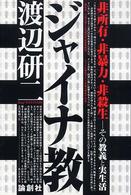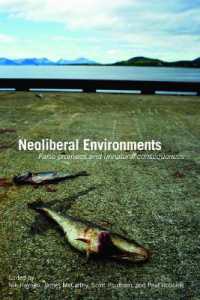- ホーム
- > 洋書
- > 英文書
- > Politics / International Relations
Full Description
Originally published in 1987, this book focusses on the debate around the international role of the working class and other dominated classes such as the rural and urban poor. The contributions discuss whether Marx's original version of the revolutionary role of workers can still be sustained. They examine the response of workers to the globalisation of production, to structural unemployment in the industrialized world and to the changing composition of the workforce in the industrialising periphery. The volume questions the historic starting points in the theorization of international labour.
Contents
Part 1: Theoretical Perspectives 1. Theorising International Labour Robin Cohen 2. World Market Competition and Restrictions Upon International Trade Union Policies Werner Olle and Wolfgang Schoeller 3. Labour and Development Paresh Chattopadhyay 4. Theorising the Class Struggle: The Vietnamese Experience Ken Post Part 2: Class Formation and the Labour Movement 5. The Formation of the Working Class in Central America Pierre Beaucage 6. The Labour Movement in Argentina and Brazil: A Comparative Perspective Ronaldo Munck 8. New Trends in the Internationalisation of Production: Implications for Female Workers Ofelia Gómez de Estrada and Rhoda Reddock 9. Cheap Labour in the 'Informal Sector' in Africa: The Case of Children and Apprentices Alain Morice 10. The 'New' International Division of Labour and the Sahel of the 1970s Jean Copans 11. Labour Migration and the Liberation Struggle in Southern Africa John Loxley Part 4: Concluding Bibliography 12. A New International Labour Movement in the Making: A Bibliographical Note Peter Waterman 13. International Labour Studies: A Third World and Labour-Orientated Bibliography Peter Waterman and Matty Klatter.








